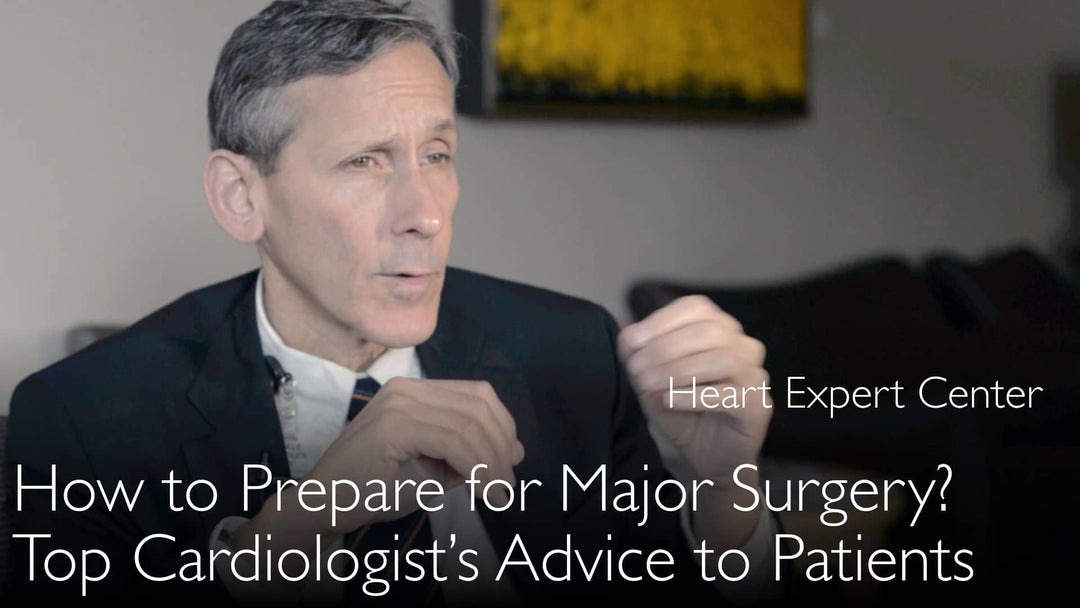Leading cardiology expert, Dr. Dale Adler, MD, shares essential strategies for preparing for major surgeries, such as heart, spine, neurosurgery, or cancer surgery. He emphasizes the importance of mental preparation and lifestyle changes, like quitting smoking and increasing physical activity, weeks before surgery. Dr. Adler discusses the benefits of seeking a second opinion to confirm diagnoses and treatment plans, particularly for heart valve diseases like aortic stenosis and mitral regurgitation. He also highlights the recovery timeline, noting that many patients feel significantly better shortly after surgery, with full recovery expected within two months.
Effective Strategies for Preparing for Major Surgery
Jump To Section
- Mental Preparation for Surgery
- Lifestyle Changes Before Surgery
- Importance of a Second Opinion
- Recovery Timeline After Surgery
- Patient Success Stories
- Full Transcript
Mental Preparation for Surgery
Dr. Dale Adler, MD, stresses the importance of mental preparation for major surgeries like heart, spine, or cancer surgery. Surgery can be a significant source of anxiety, and preparing mentally can help patients cope better with the stress. Understanding the procedure and having a positive mindset can contribute to a smoother surgical experience and recovery.
Lifestyle Changes Before Surgery
Dr. Adler advises patients to make specific lifestyle changes weeks before surgery. Quitting smoking at least six to eight weeks prior can significantly improve surgical outcomes. Increasing physical activity, even slightly, can also benefit patients, especially those with sedentary lifestyles. These changes help improve overall health and prepare the body for the stress of surgery.
Importance of a Second Opinion
Seeking a second opinion is crucial, particularly for heart valve diseases such as aortic stenosis and mitral regurgitation. Dr. Adler highlights that a second opinion ensures the diagnosis is accurate and the treatment strategy is optimal. This step provides patients with confidence in their treatment plan and can lead to better surgical outcomes.
Recovery Timeline After Surgery
According to Dr. Adler, the recovery timeline after heart valve surgery varies. Some patients feel better as soon as the third day post-surgery, despite some discomfort. Generally, patients feel significantly improved within a month, and by two months, they often feel much better than before the surgery. This timeline can vary based on individual health conditions and the complexity of the surgery.
Patient Success Stories
Dr. Adler shares that witnessing patients' recovery is highly rewarding. Many patients who struggled before surgery experience a dramatic improvement in their quality of life post-surgery. These success stories highlight the importance of proper preparation and the effectiveness of surgical interventions in treating heart valve diseases.
Full Transcript
Dr. Anton Titov, MD: How to prepare weeks before surgery, whether it's heart surgery, spine surgery, neurosurgery, or cancer surgery, is crucial. It is important to prepare for surgery mentally, as major surgery can make anyone anxious. Here, a top cardiologist shares his experience.
Dr. Anton Titov, MD: Advice to patients on preparation for surgery includes what to do several weeks in advance. This video interview with a top expert in cardiology discusses how to prepare for heart surgery and ensure a fast recovery. What can patients do to prepare for any major surgical operation? An experienced Boston cardiologist talks about the steps patients can take before surgery.
Dr. Dale Adler, MD: Preparation before heart surgery is similar to preparation for any surgery. People should prepare for surgery as they would for any stressful circumstance in life. We would love for patients to be fit. Sometimes a patient smokes, and it is extremely helpful if they stop smoking for at least six or eight weeks before the surgical operation.
Even six or eight weeks of not smoking before surgery makes a big difference?
Dr. Dale Adler, MD: Yes, it makes a big difference, you are absolutely correct. Some patients lead a sedentary lifestyle. It makes a big difference if they become even a little more active before the surgical operation. It is tough because often patients have severe heart valve problems.
Valvular heart disease creates shortness of breath. Patients probably won't get really fit before surgery, but those actions are the only things that patients can hope to accomplish before surgery.
What about after the surgical operation?
Dr. Dale Adler, MD: The correct time for heart surgery is when patients have just started to show some symptoms of heart problems. Heart valve repair in these patients will make them feel better very quickly. Their heart will have plenty of reserve in function.
Sometimes it is a beautiful story. On the third day after surgery, patients already say they feel better, even though they still have discomfort from the surgical operation. That is a wonderful group, and it really doesn't take very much after the surgery to take care of these patients.
Of course, you have many more patients who are different. For them, the surgical procedure itself has been a real stress to their body. They are more tired, and it just takes time. We usually say that it takes about one month for patients after heart valve surgery to feel pretty good. We hope that in two months after heart valve disease surgery, the patients feel terrific.
Dr. Anton Titov, MD: It is probably very gratifying to see patients who were not doing well before.
Dr. Dale Adler, MD: And after the surgery, they fly! It is wonderful! As a physician, that is your goal, and nothing makes you feel better. Preparing for major surgery involves key things to do several weeks before surgery.




